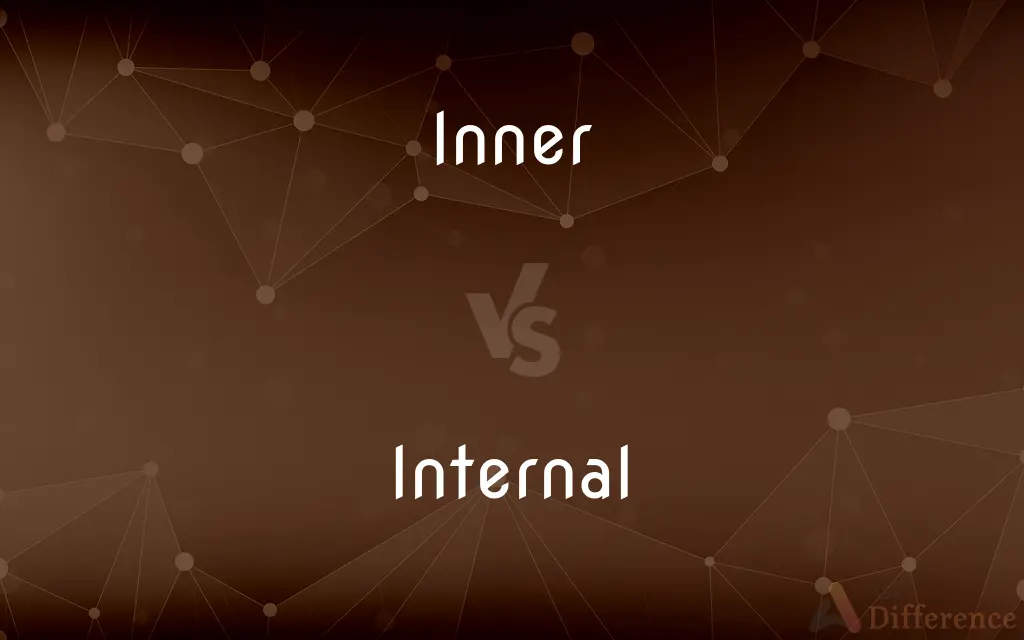Inner vs. Internal — What's the Difference?
By Maham Liaqat & Urooj Arif — Updated on March 17, 2024
Inner focuses on the most central or core part, often implying importance or intimacy, while internal refers to anything located inside, emphasizing location over significance.

Difference Between Inner and Internal
Table of Contents
ADVERTISEMENT
Key Differences
Inner is typically used to describe something that lies within the most central, essential, or intimate part of something else. It suggests a level of importance or closeness that is not merely physical. For instance, when discussing thoughts or feelings, one might refer to their innermost desires, indicating a deep, personal aspect. On the other hand, internal is used more broadly to refer to anything located on the inside of something, whether it be a physical object, an organization, or a body. The term "internal organs" illustrates this usage, focusing on location within the body rather than implying any sort of emotional depth or core significance.
While "inner" can convey a metaphorical or emotional depth, such as in the phrases "inner peace" or "inner circle," suggesting a level of exclusivity or significant personal value, "internal" is often used in more technical or clinical contexts. Internal processes within a company, for instance, refer to the operations that happen within the organization, without necessarily implying any hierarchy of importance or intimacy. This distinction highlights how the terms differ in the weight of intimacy and emotional depth they carry.
The usage of "inner" can also imply a protective layer or a barrier to the outside world, denoting something that is not easily accessible or visible to outsiders. It signifies a closer, more guarded aspect of a person, place, or thing. Conversely, "internal" simply denotes that something is situated within the confines of something else, without suggesting any form of protection or exclusivity. For example, internal reports of a company are meant for employees or members within the organization, indicating location rather than accessibility or closeness.
In discussing spatial relationships, "inner" might be used to describe the core area of a geographical location or structure, such as the inner city, highlighting central or critical parts. Whereas "internal" could describe any aspect or part located inside a defined space, without implying any central or critical importance. This distinction is evident in the comparison between an inner sanctum, a term laden with connotations of exclusivity and significance, and internal spaces, which simply denote areas within a larger structure.
Comparison Chart
Focus
Core or essential part, intimacy, significance
Location inside, without implying significance
ADVERTISEMENT
Usage Contexts
Emotional depth, exclusivity, protected aspects
Technical, organizational, physical location
Implied Connotation
Importance, closeness, guarded
Situated within, neutral towards importance
Example Usage
"Inner thoughts," "inner circle"
"Internal organs," "internal processes"
Spatial Relation
Central, critical parts, metaphorically deep
Any part located inside, without centrality focus
Compare with Definitions
Inner
Located towards the inside or center.
The inner layers of the earth are composed of molten rock.
Internal
Situated or existing within something.
The internal structure of the building was redesigned for efficiency.
Inner
Protected or secluded from the outside.
The inner sanctum of the temple was only accessible to priests.
Internal
Relating to the domestic affairs of a country.
The government focused on addressing internal issues.
Inner
More private or intimate.
She shared her innermost fears with her closest friend.
Internal
Occurring within the body.
Internal injuries can be serious even if not immediately visible.
Inner
Relating to the mind or spirit.
Meditation helps in finding inner peace.
Internal
Inward feelings or thoughts.
He struggled with internal conflicts about his future.
Inner
Essential or fundamental.
Trust is the inner fabric of their friendship.
Internal
Pertaining to the operations of an organization.
The company is conducting an internal review of its policies.
Inner
Situated inside or further in; internal
The inner thigh
An inner courtyard
Internal
Of, relating to, or located within the limits or surface; inner.
Inner
Mental or spiritual
A test of inner strength
Internal
Residing in or dependent on essential nature; intrinsic
The internal contradictions of the theory.
Inner
The inner part of something
Using his rock shoes as inners for his double boots
Internal
Located, acting, or effective within the body.
Inner
Located or occurring farther inside
An inner room.
An inner layer of warm clothing.
Internal
Of or relating to mental or spiritual nature
"An internal sense of righteousness dwindles into an external concern for reputation" (A.R. Gurney, Jr.).
Inner
Less apparent; deeper
The inner meaning of a poem.
Internal
Of or relating to the domestic affairs of a nation, group, or business.
Inner
More exclusive, influential, or important
The inner circles of government.
Internal
Of or situated on the inside.
We saw the internal compartments of the machine.
Inner
Being or occurring (farther) inside, situated farther in, located (situated) or happening on the inside of something, situated within or farther within contained within something.
Inner door;
Inner room;
Inner sanctum;
Inner surface
Internal
(medicine) Within the body.
Her bleeding was internal.
Inner
Close to the centre, located near or closer to center.
The inner suburbs
Internal
Concerned with the domestic affairs of a nation, state or other political community.
The nation suffered from internal conflicts.
The minister of internal affairs
Inner
Inside or closer to the inside of the body.
Inner ear
Internal
Concerned with the non-public affairs of a company or other organisation.
An internal investigation was conducted.
Inner
Of mind or spirit, relating to the mind or spirit, to spiritual or mental processes, mental, spiritual, relating to somebody's private feelings or happening in somebody's mind, existing as an often repressed part of one's psychological makeup.
Inner confidence;
Inner strength;
Inner life;
Inner child;
Inner artist;
Inner peace;
Inner light
Internal
(biology) Present or arising within an organism or one of its parts.
An internal stimulus
Inner
Not obvious, private, not expressed, not apparent, hidden, less apparent, deeper, obscure; innermost or essential; needing to be examined closely or thought about in order to be seen or understood.
Inner meaning;
Inner resources;
Inner logic
Internal
(pharmacology) Applied or intended for application through the stomach by being swallowed.
An internal remedy
Inner
Privileged, more or most privileged, more or most influential, intimate, exclusive, more important, more intimate, private, secret, confined to an exclusive group, exclusive to a center; especially a center of influence being near a center especially of influence.
Inner circle;
Inner council
Internal
Experienced in one's mind; inner rather than expressed.
Internal feelings
Inner
An inner part.
Internal
Of the inner nature of a thing.
Inner
(South Africa) A duvet, excluding the cover.
Internal
Attending a university as well as taking its examinations.
Inner
A forward who plays in or near the center of the field.
Internal
Inward; interior; being within any limit or surface; inclosed; - opposed to external; as, the internal parts of a body, or of the earth.
Inner
(cricket) A thin glove worn inside batting gloves or wicket-keeping gloves.
Internal
Derived from, or dependent on, the thing itself; inherent; as, the internal evidence of the divine origin of the Scriptures.
Inner
(UK politics) One who supports remaining in the European Union.
Internal
Pertaining to its own affairs or interests; especially, (said of a country) domestic, as opposed to foreign; as, internal trade; internal troubles or war.
Inner
The 2nd circle on a target, between the bull (or bull's eye) and magpie.
Internal
Pertaining to the inner being or the heart; spiritual.
With our Savior, internal purity is everything.
Inner
Further in; interior; internal; not outward; as, an inner chamber.
Internal
Intrinsic; inherent; real.
The internal rectitude of our actions in the sight of God.
Inner
Of or pertaining to the spirit or its phenomena.
This attracts the soul,Governs the inner man, the nobler part.
Internal
Lying toward the mesial plane; mesial.
Inner
Not obvious or easily discovered; obscure.
Internal
Happening or arising or located within some limits or especially surface;
Internal organs
Internal mechanism of a toy
Internal party maneuvering
Inner
Located or occurring within or closer to a center;
An inner room
Internal
Occurring within an institution or community;
Intragroup squabbling within the corporation
Inner
Innermost or essential;
The inner logic of Cubism
The internal contradictions of the theory
The intimate structure of matter
Internal
Inside the country;
The British Home Office has broader responsibilities than the United States Department of the Interior
The nation's internal politics
Inner
Confined to an exclusive group;
Privy to inner knowledge
Inside information
Privileged information
Internal
Innermost or essential;
The inner logic of Cubism
The internal contradictions of the theory
The intimate structure of matter
Inner
Exclusive to a center; especially a center of influence;
Inner regions of the organization
Inner circles of government
Inner
Inside or closer to the inside of the body;
The inner ear
Common Curiosities
What distinguishes "inner peace" from "internal peace"?
"Inner peace" suggests a deep, personal state of calm and contentment, while "internal peace" is less common and would imply peace within oneself without the depth "inner" conveys.
What does "inner" imply in a personal context?
In a personal context, "inner" implies a level of emotional depth, privacy, or intimacy, such as inner feelings or thoughts.
Can "internal" be used to describe thoughts or feelings?
Yes, "internal" can describe thoughts or feelings, focusing on their location within the mind rather than emotional depth.
Can "inner" and "internal" be used interchangeably?
While they can sometimes be used interchangeably, especially when referring to location, their connotations and nuances often make them distinct in usage.
What implications does "inner" have in spiritual contexts?
In spiritual contexts, "inner" refers to the soul or core essence of a person, suggesting depth and significance in one's spiritual journey.
How does "inner circle" differ from "internal group"?
"Inner circle" refers to a small, exclusive group close to a person or organization's core, while "internal group" suggests a group within an organization without implying closeness or exclusivity.
Is "internal" more clinical or technical than "inner"?
Yes, "internal" is often used in more clinical or technical contexts, such as in medicine or organizational processes, whereas "inner" carries more personal or intimate connotations.
Is there a difference in the level of accessibility between "inner" and "internal"?
"Inner" often implies a higher level of inaccessibility or exclusivity due to its association with importance or intimacy, while "internal" merely denotes inside location.
How does "inner strength" differ from "internal strength"?
"Inner strength" refers to a deep, personal resilience or fortitude, while "internal strength" could imply physical endurance within the body, though it's less commonly used in this context.
How do "inner beauty" and "internal beauty" compare?
"Inner beauty" is a common term for qualities like kindness and compassion, suggesting deep, essential virtues, while "internal beauty" is less commonly used and lacks the same depth of meaning.
Can both "inner" and "internal" refer to physical locations?
Yes, both can refer to physical locations, but "inner" often emphasizes centrality or importance, while "internal" focuses on being inside something.
How do "inner workings" compare to "internal mechanisms"?
"Inner workings" suggest crucial or essential mechanisms often hidden or protected, while "internal mechanisms" refer to the operational parts inside something, without implying importance.
Does "internal" always imply a physical boundary?
While often related to physical boundaries, "internal" can also refer to boundaries within systems or organizations, not just physical ones.
Share Your Discovery

Previous Comparison
Pig vs. Boar
Next Comparison
Seraph vs. CherubAuthor Spotlight
Written by
Maham LiaqatCo-written by
Urooj ArifUrooj is a skilled content writer at Ask Difference, known for her exceptional ability to simplify complex topics into engaging and informative content. With a passion for research and a flair for clear, concise writing, she consistently delivers articles that resonate with our diverse audience.
















































